Impact Stories
Who will be the change makers, leaders, and environmental stewards of tomorrow? Below are a few of their stories. Your support makes experiences like these possible. By connecting people of different ages, backgrounds, and experiences to nature—especially young people—you are helping to ensure a bright future for all.
Summer Youth Program Long-Term Participant Impacts Survey
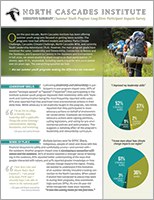
Heather, Reflections of a Parks Climate Challenge Alum

...All together, we were a group of four NCI leaders and 19 high school students from the greater Seattle, San Francisco, Denver, Chicago, and DC areas. We made up the pilot cohort for the Parks Climate Challenge, that would later evolve into the Cascades Climate Challenge program, and then become the Youth Leadership Adventures program – which still exists today, over a decade later.
...Many of our adventures had direct connections to understanding climate change effects firsthand in the ecosystems we were exploring. During that time, we gained knowledge, skills, more confidence in our abilities, and genuine connections with people that cared about each other, communities, and the environment.
...I’d had a general interest in the environmental career field during high school, but the exposure to NCI, the Park Service, and other professionals helped me realize how tangible an environmentally-centered career could be, and demonstrated the broad variety of career path options.
Looking back, 11+ years later, my experiences with NCI were major stepping stones in my education and career journey.
Learn more about Heather’s adventures with North Cascades Institute and what she’s up to now in her blog post.
2020 Youth Leadership Adventures Podcast
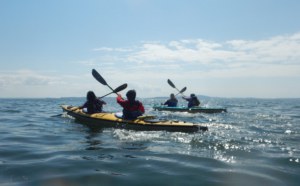
John Lahey, 5th Grade Teacher
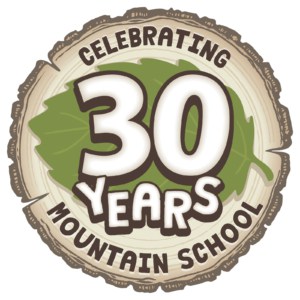
Q: Tell us about your Mountain School experience.
For me, Mountain School is a passion. My background is in environmental education so teaching 5th grade is a great opportunity for me to get students into the mountains. I have brought students up to Mountain School for the past 20 years, going back to the days of “Big Green.” Some may wonder if going to Mountain School for so long has started to get old for me. Fortunately I love being in the North Cascades so it never gets old! Ultimately, though, Mountain School is not about me. Mountain School is about the students. It may be my fifth, tenth, twentieth (or someday my thirtieth) time at Mountain School, but it is the student’s first. Every year I take my class to Mountain School, it is their first time.
Q: Can you share a favorite Mountain School memory?
One of my favorite memories was in April 2013. Students, as often is the case, were excited yet nervous about wildlife they might see while at Mountain School. In the 20 years I have attended Mountain School, this was the first time that I would see a bear with a group of students. As expected, they were a bit nervous at first. That nervousness soon turned to a calm excitement when they realized they were not in any danger.
We watched the bear in the field for about 15-20 minutes before heading back to the trail. Some of the students were in disbelief that they had just seen a bear and realized just how lucky they were to see such an amazing animal in its natural habitat – its “living room.”
At this point some of the students realized that the best way to get over their fears is to learn about them and experience them first-hand. They also connected their bear experience to their “being in wilderness” experience. Read more ...
Marisol, Youth Leadership Adventures
I am a 17 year old Latina from Mount Vernon, Washington. The North Cascades Institute has been a part of my life for over two years now. I have done two trips with Youth Leadership Adventures as well as the Youth Ambassador program. These experiences have changed me to become a better person.
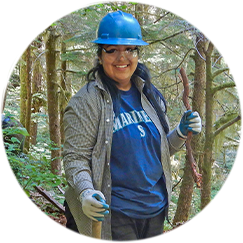
I am proud to say after my backpacking trip, I hiked over 40 miles with a 50 pound pack on my back! There were moments where I wanted to cry and give it all up, but I knew I was not quitting! I learned that anything is possible when it comes to your mindset and staying positive, even during the times when you just want to give up.
Programs like this are not only helping me in the future but giving me the chance to explore this beautiful Washington that many of us minorities don’t have the time or money to get to do. I am applying to universities for next fall and hope to pursue a career in medicine and the outdoors because I think the uses for plants are super interesting.
This program will always hold a special place in my heart because I have had so many great experiences and still remain in contact with all my friends I met in YLA. We truly changed each others’ lives.
Inna, Youth Leadership Adventures Intern

I’ve grown my enthusiasm for learning every year since by participating in additional Youth Leadership programs. I attend the Northwest Youth Leadership Summit and last year I was a Youth Ambassador. We went on field trips, volunteered with park rangers, and learned about college and career planning. After Ambassadors, I participated in the 12-day Science and Sustainability YLA Trip this summer.
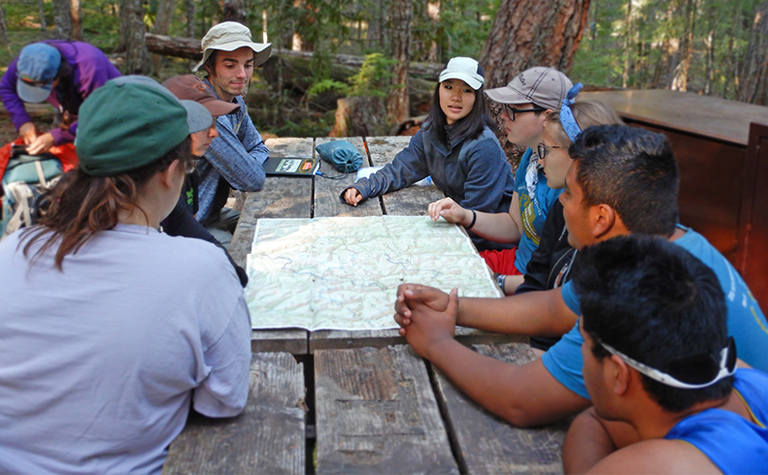
Inna with her trail group during Youth Leadership Adventures in 2018
Leadership and public speaking were always challenges that I faced. I had trouble saying what was on my mind and seeing myself as a leader. This summer, our instructor Dakota taught me that everyone is a leader, just in their own way. I had similar lessons before, but this time it sunk in. Taking the very definition of “leader,” I gravitate towards being more of a “guide,” known as “Participative leadership.” I am on an unending path to finding my way as leader.
Now I look forward to interning with YLA this summer, and attending Skagit Valley College this fall. I’m proud of having been an Ambassador, a Ross Lake Leader, and a Cascadian Cookie Bear. And I’m thankful to be part of such a significantly important group of outdoorists and tree huggers in the PNW.
Mia, Youth Leadership Ambassador
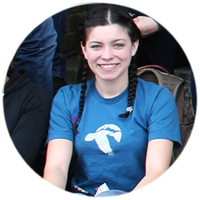
During our trip, we hiked over 90 miles, completed stewardship projects, studied wildlife and glaciology, and helped each other grow. I pushed myself and came to know myself in a new way. After my trip, the Youth Ambassador program taught me useful college skills.
These programs shaped my environmental consciousness by changing my actions. I used to not think twice about the ground I walked on. Now, I've seen the effects on an environmental area when we complete a project together. Even more, YLA shaped the way I view people. I realized that we all share commonalities. I formed connections with peers who are now my friends, with mentors who work for the park service, and most of all, with people who care about me. Thanks to the people at the North Cascades Institute, I know that I'll always have someone in my corner.
Today I'm at Skagit Valley Community College, working toward a degree in environmental conservation. I am pursuing my dream job to be a wildlife biologist so that I can preserve our wildlife for future generations to come.
Eric Henry, Science Teacher
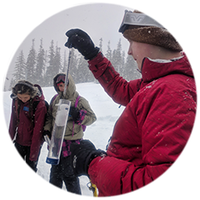
Our annual field trip to Mt. Baker Snow School shifts that paradigm. Students are exposed to the value of public lands. They explore the national forest outside their door. They travel on snowshoes to experience the mountains in winter. And they engage in “real-world” scientific experience, which is a vital component of Next Generation Science Standards and a core part of our science curriculum.
Working with outside organizations is another vital part of science education. Through Snow School our students learn from representatives of North Cascades Institute, US Forest Service, Mt. Baker Ski Area, Northwest Avalanche Center (NWAC) and with students & professors from Western Washington University (WWU). Imagine … eighth graders working directly with a university professor!
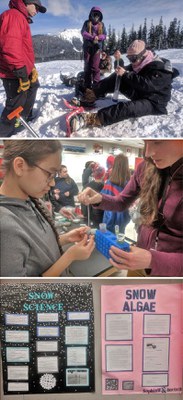
We created a Community Symposium that allowed students to evaluate their own work and learn from others, and gave them an opportunity to articulate their learning to the community. The Snow Algae group found repeatable results that even surprised Dr. Kodner! And we were able to inform the general public about both snow science and snow algae, which many people had been completely unaware of before.
Snow School is providing excellent opportunities for Mount Baker Junior High students to better know their local natural area as well as rare, real-world science experience!
Imara, Youth Leadership Adventures Apprentice
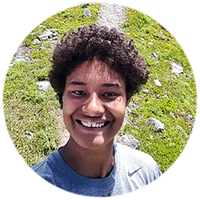
There aren’t many opportunities for low-income or people of color to get this kind of experience. I never imagined that I could be an outdoor educator because I never had the opportunity to go camping, much less encounter a park ranger. I didn’t know jobs like this existed until now. I suspect that is true for many kids coming on courses.
Youth Leadership Adventures means so much to me and to so many students. For a lot of kids in the program, the North Cascades become a second home, and they saw us apprentices as role models - people who they could be one day if they work hard and pursue their outdoor interests.
This apprenticeship allows students to pursue outdoor education as a realistic career; it helps create the next generation of outdoor educators!
Kang Pu, Youth Leadership Adventures
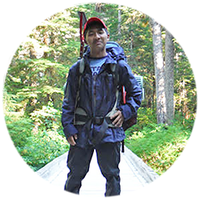
At 13 he needed to start providing for his family so he walked for two days to India with a water buffalo, which he sold to buy a plane ticket to Malaysia.
I worked for three years helping to prepare dim sum at a Chinese restaurant. I could not go to school there, but could send almost all of the money I earned to my family in Burma. I missed my family and my country very deeply, but I knew that there was more opportunity elsewhere.”
In 2014, he flew to the US with his aunt and uncle, and they got refugee status. Kang Pu now attends Foster High School and is working on his English. He told his school newspaper in February,
When I first arrived here, I just walked around and looked at all the trees; there were not very many of those where I was living in Kuala Lumpur.”
Being in a national park particularly inspired Kang Pu during his Youth Leadership Adventures course in 2015. After completing his education, he hopes to return to Burma as businessman to help with education and perhaps even start a national park.
After we cut down all the trees, the birds and animals went to other places. I want them to come back. I want to create the first Burmese National Park to protect the land, animals and birds, including Zomi’s national emblem, the hornbill. The hornbill symbolizes a noble and beautiful life characterized by love and faithfulness.”
Youth Leadership Adventures taught Kang Pu how to be a good follower and good leader.
I learned how to speak in front of others and why getting outside is important. Other students should do this program because if they just stay home they won’t learn anything. We learn how to take care of the environment when we face challenges, go outside, and meet new people.”
Kang Pu was featured in The Everett Herald!
JJ, Youth Leadership Adventures
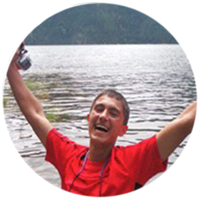
But in 6th grade he started biking and skiing. This newfound connection to nature led to participating with local environmental groups and starting an environmental club at his school. But he still didn’t consider himself a leader and in fact had a deep fear of public speaking.
By the end of the first day of his Outdoor Leadership course, his group had nicknamed him Smiley.
I was told by my group that my smile had an impact on them. Being told this really boosted my self-confidence because it let me know that I’m not negative and I’m easily liked.”
When JJ first began getting outdoors it had been as an escape from the realities of everyday life, but he now understands the connection between his life in Yakima and the natural world.
JJ waxed poetically about his time.
I was once eroded by other forces, torn down, rolled down to the bottom of valleys, canyons, and crevasses. But now I’m a mountain reaching to the skies, a tree growing up to the top of the tree line, and a rock continuing its journey in the rushing river of life. Thanks to my summer experience in Youth Leadership Adventures, I have learned that I am a positive and successful leader... I will help protect the environment because the environment is just like me.”
JJ came back in 2015 for the Science and Sustainability course and is now president of his school’s ecology club, increasing the number of club members and days in the field.
Joseph, Youth Leadership Adventures
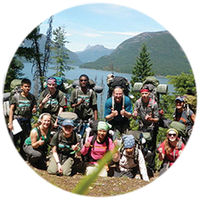
On his first day of class in the US, Joseph was intrigued by an opportunity offered to him during a North Cascades Institute presentation: spend 8 days in the wilderness learning outdoor, stewardship and leadership skills with Youth Leadership Adventures. Four months later, he was on the trail with a backpack and team of peers and mentors that would change his life.
Because of his background as a refugee, he assumed people wouldn’t like him and so was always on the defensive. And despite speaking six languages, Joseph was uncomfortable speaking English in front of others.
Youth Leadership Adventures gave him the opportunity to conquer these fears in a safe, supportive environment and to learn, alongside his peers, the value of nature and how he could make a positive difference in the world.
Joseph began to understand that others didn’t hate him, but rather the hate and guilt he had carried within himself all these years following his friend’s death had drastically impaired his ability to make friends. The most challenging experience was presenting his story, in English, to the adult visitors who came midway through the trip. He challenged himself and was able to share his aspirations to one day become an EMT or Search and Rescue member.
My experiences from my summer trip influenced me to become a man who values nature, animals, and friends. Also, it made me become a more confident and social man than I was before."
Joseph was nominated to participate in the national program, TEEN CERT (Community Emergency Response Team) in Tukwila, and is now a trained volunteer able to assist in his community. Joseph’s path to achieving his life-long goal to help save lives was jumpstarted through his participation in Youth Leadership Adventures
Crystal, Youth Leadership Adventures Apprentice
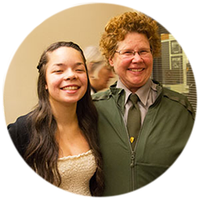
She was elated when she received a scholarship that enabled her to take the course:
I felt so blessed! When the Institute assured me that things I didn’t have, like a sleeping bag and hiking boots, would be provided to me, I just remember feeling so welcomed!”
Camping, canoeing and hiking were all new for Crystal, and her ability to look at any situation with a positive attitude turned these challenges into opportunities.
After this summer, I feel like I can do anything! The leadership skills and confidence I gained is something I will never forget.”
And we’re lucky that Crystal’s story continued with us. She spoke to an adult audience for the Wild Nearby North Cascades book, organized a fun run at her school to raise money for the Kulshan Creek program and came back as a Youth Leadership Adventures apprentice in 2015. She's now attending Pacific Lutheran University and continues to look for opportunities to help others grow and connect with nature.
Bianca, Wildfire Firefighter
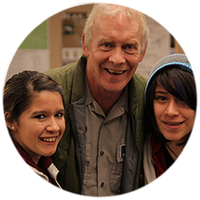
I can still remember all my emotions I got that phone call saying I was accepted to go on this trip! Pure shock, excitement, anticipation, and wonder overcame me. Once I actually got to go on the trip, my whole point of view of the world changed, and many doors opened up for me.”
The following summer, Bianca participated in a 3-week Watershed Ecology program in Alaska, then came back to attend our inaugural Youth Leadership Conference.
Once I viewed the beauty of the North Cascades, I realized something. I actually want to help preserve this captivating place for many future generations. My group leaders taught me how important it is to care for natural areas, and what we can do to help conserve it."
Bianca continued her work on public lands in the summer of 2015. After the Goodall Wildfire blew up in the Newhalem Gorge that summer, it began spreading toward our Environmental Learning Center. Two fire crews were called in, including Bianca who was working on the North Zone fire engine for Mount Baker-Snoqualmie National Forest.
It was amazing returning to North Cascades Institute not as a wide-eyed student just starting to learn about nature and stewardship, but as a wildlands firefighter working for the Forest Service. It really felt like coming full circle, and I don't think I'd be where I am today without those early experiences with the Institute."
Indira, Kulshan Creek Neighborhood Youth Program Assistant

It was totally different—a whole new world I’d never seen before and it was pretty cool.”
She recalls how the Mountain School trail groups broke up the cliques and brought everyone together.
While Mountain School made a big impression on her, Indira didn’t stop there. In 2009 and 2011 she participated in what is now our Youth Leadership Adventures program. She spent over a month in the North Cascades overcoming the challenges of being placed far outside one’s comfort zone.
I grew so much from this opportunity to lead others.”
Indira went on to become an assistant with our Kulshan Creek Neighborhood Youth program that provides monthly field trips to youth and their families from three Skagit Valley neighborhoods. “It’s a great opportunity for families to bond, to go outside and do fun things that they wouldn’t otherwise have the means to do.” Having grown up having to make do with less, Indira knows the importance of these opportunities. Indira came full circle last year when she returned to Mountain School as a chaperone with Kulshan Creek.

